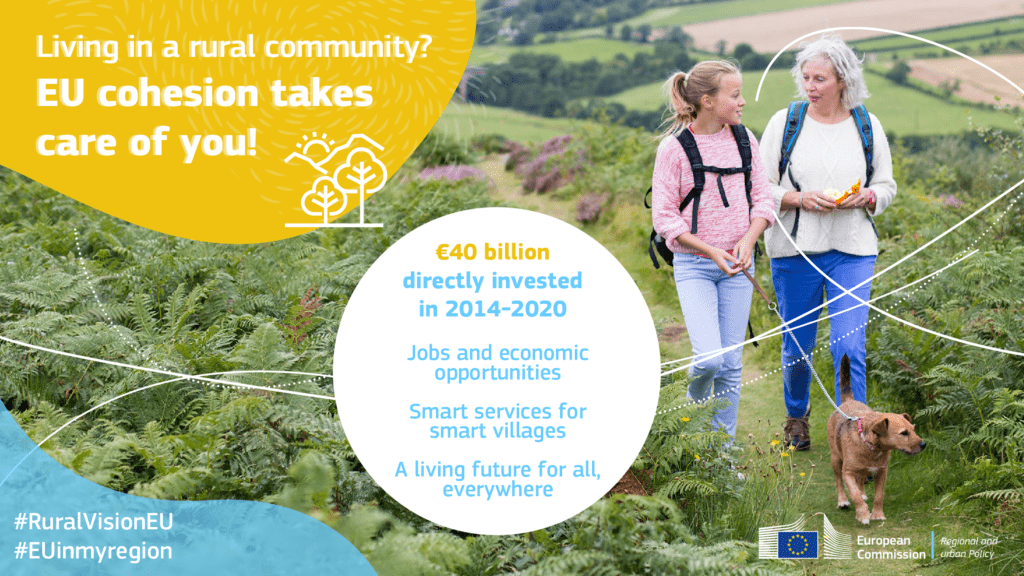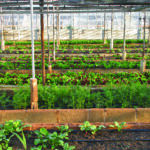The European Commission has today put forward a long-term vision for the EU’s rural areas, identifying the challenges and concerns that they are facing, as well as highlighting some of the most promising opportunities that are available to these regions. Based on foresight and wide consultations with citizens and other actors in rural areas, today’s Vision proposes a Rural Pact and a Rural Action Plan, which aim to make our rural areas stronger, connected, resilient and prosperous.
To successfully respond to the megatrends and challenges posed by globalisation, urbanisation, ageing and to reap the benefits of the green and digital transitions, place-sensitive policies and measures are needed that take into the account the diversity of EU’s territories, their specific needs and relative strengths.
In rural areas across the EU the population is on average older than in urban areas, and will slowly start to shrink in the coming decade. When coupled with a lack of connectivity, underdeveloped infrastructure, and absence of diverse employment opportunities and limited access to services, this makes rural areas less attractive to live and work in. At the same time, rural areas are also active players in the EU’s green and digital transitions. Reaching the targets of the EU’s digital ambitions for 2030 can provide more opportunities for the sustainable development of rural areas beyond agriculture, farming and forestry, developing new perspectives for the growth of manufacturing and especially services and contributing to improved geographical distribution of services and industries.
This long-term Vision for the EU’s rural areas aims to address those challenges and concerns, by building on the emerging opportunities of the EU’s green and digital transitions and on the lessons learnt from the COVID 19 pandemic, and by identifying means to improve rural quality of life, achieve balanced territorial development and stimulate economic growth.
Rural Pact
A new Rural Pact will engage actors at EU, national, regional and local level, to support the shared goals of the Vision, foster economic, social and territorial cohesion and respond to the common aspirations of rural communities. The Commission will facilitate this framework through existing networks, and encourage the exchange of ideas and best practices at all levels.
EU Rural Action Plan
Today, the Commission has also put forward an Action Plan to prompt sustainable, cohesive and integrated rural development. Several EU policies already provide support to rural areas, contributing to their balanced, fair, green and innovative development. Among those, the Common Agricultural Policy (CAP) and the Cohesion Policy will be fundamental in supporting and implementing this Action Plan, while being accompanied by a number of other EU policy areas that together will turn this Vision into a reality.
The Vision and Action Plan identify four areas of action, supported by flagship initiatives, to enable:
- Stronger: focus on empowering rural communities, improving access to services and facilitating social innovation;
- Connected: to improve connectivity both in terms of transport and digital access;
- Resilient: preserving natural resources and greening farming activities to counter climate change while also ensuring social resilience through offering access to training courses and diverse quality job opportunities;
- Prosperous: to diversify economic activities and improve the value added of farming and agri-food activities and agri-tourism.
The Commission will support and monitor the implementation of the EU Rural Action Plan and update it on a regular basis on a regular basis to ensure that it remains relevant. It will also continue to liaise with Member States and rural actors to maintain a dialogue on rural issues. Furthermore, “rural proofing” will be put in place whereby EU policies are reviewed through a rural lens. The aim is to better identify and take into consideration the potential impact and implication of a Commission policy initiative on rural jobs, growth and sustainable development.
Finally, a rural observatory will be set up within the Commission to further improve data collection and analysis on rural areas. This will provide evidence to inform policy-making in relation to rural development and support the implementation of the Rural Action Plan.
Next steps
Today’s announcement of the Long-Term Vision for Rural Areas marks the first step towards stronger, better connected, resilient and prosperous rural areas by 2040. The Rural Pact and EU Rural Action Plan will be the key components to achieve these goals.
By the end of 2021, the Commission will link up with the Committee of the Regions to examine the path towards the goals of the Vision. By mid-2023, the Commission will take stock of what actions financed by the EU and Member States have been carried out and programmed for rural areas. A public report, that will be published in early 2024, will identify areas where enhanced support and finances are needed, as well as the way forward, based on the EU Rural Action Plan. The discussions around the report will feed into the reflection on the preparation of the proposals for the 2028-2034 programming period.
Background
The need for designing a long term vision for rural areas was underlined in President von der Leyen’s political guidelines and in the mission letters to Vice-President Šuica, Commissioner Wojciechowski and Commissioner Ferreira.
Article 174 TFUE calls for the EU to pay particular attention to rural areas, among others, when promoting its overall harmonious development, strengthening its economic, social and territorial cohesion and reducing disparities between the various regions.
A Eurobarometer survey was carried out in April 2021 assessing the priorities of the Long-Term Vision for Rural Areas. The survey found that 79% of EU citizens supported the EU should give consideration to rural areas in public spending decisions; 65% of all EU citizens thought that the local area or province should be able to decide how EU rural investment is spent; and 44% mentioned transport infrastructure and connections as a key need of rural areas.
The Commission ran a public consultation on the Long-Term Vision for Rural Areas from 7 September to 30 November 2020. Over 50% of respondents stated that infrastructure is the most pressing need for rural areas. 43 % of respondents also cited access to basic services and amenities, such as water and electricity as well as banks and post offices, as an urgent need Over the next 20 years, respondents believe that the attractiveness of rural areas will largely depend on the availability of digital connectivity (93%), of basic services and e-services (94%) and on improving the climate and environmental performance of farming (92%).
Members of the College said
Vice President for Democracy and Demography, Dubravka Šuica said: “Rural areas are home to almost 30% of the EU population and it is our ambition to significantly improve their quality of life. We have listened to their concerns and, together with them, built this vision based on the new opportunities created by the EU’s green and digital transitions and on the lessons learnt from the COVID 19 pandemic. With this Communication, we want to create a new momentum for rural areas, as attractive, vibrant and dynamic places, while of course protecting their essential character. We want to give rural areas and communities a stronger voice in building the future of Europe.”
Commissioner for Agriculture, Janusz Wojciechowski said: “Rural areas are crucial to the EU today, producing our food, safeguarding our heritage and protecting our landscapes. They have a key role to play in the green and digital transition. However, we have to provide the right tools for these rural communities to take full advantage of the opportunities ahead and tackle the challenges they are currently facing. The Long-Term Vision for Rural Areas is a first step towards transforming our rural areas. The new CAP will contribute to the Vision by fostering a smart, resilient and diversified agricultural sector, bolstering environmental care and climate action and strengthening the socio-economic fabric of rural areas. We will make sure that the EU Rural Action Plan allows for a sustainable development of our rural areas.”
Commissioner for Cohesion and Reforms, Elisa Ferreira, said: “Although we all face the same challenges, our territories have different means, strengths and capacities to cope with them. Our policies have to be sensitive to the diverse features of our regions. The democratic and cohesive Union we want has to be built closer to our citizens and territories, involving different governance levels. The Long Term Vision for Rural Areas calls for solutions designed for their specific needs and assets, with the involvement of regional and local authorities and local communities. Rural areas have to be able to deliver basic services for their population and build on their strengths to become anchors for economic development. All these objectives are at the very core of the new Cohesion Policy for 2021-2027.”
More information
In Spain
Would you like to know about projects to reduce depopulation and promote rural areas in Spain?
A great example is the project “PUEBLOS VIVOS”, a set of actions to help curb depopulation and enhance the installation of new settlers in rural territories of Aragon.
It is a project financed with a LEADER 2014-2020 grant, co-financed by the European Fund EAFRD (European Agricultural Fund for Rural Development) and funds from the Department of Agriculture, Livestock and Environment of the Government of Aragon.
More information: Pueblos Vivos Aragón







Leave a Reply